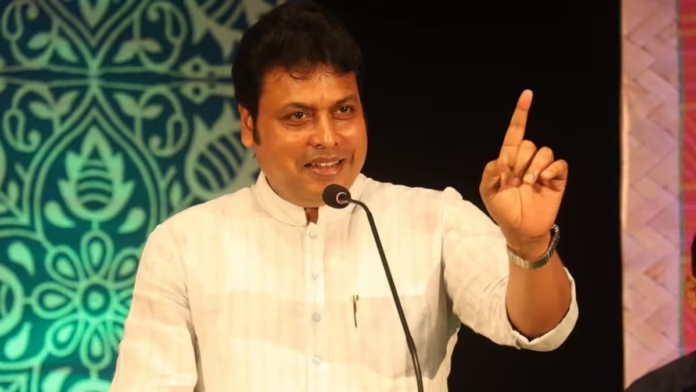Tripura MP and BJP leader Biplab Kumar Deb stirred the political pot on April 7, 2025, by launching a scathing critique of the Congress and the CPI(M), accusing both parties of failing to offer nationally recognized leadership. Speaking during a media interaction in Agartala, the former Chief Minister of Tripura claimed that while the BJP continues to grow in every corner of the country, its principal rivals remain trapped in either irrelevance or dynastic politics.
Deb began by addressing the recent leadership change in the CPI(M), where veteran Kerala leader M.A. Baby took over as General Secretary. While CPI(M) leaders and cadres welcomed the decision, Deb used the opportunity to question the party’s ability to project leaders with national appeal. He stated that very few outside Kerala and traditional Left strongholds could identify M.A. Baby without having to look him up. He suggested that the CPI(M)’s focus on ideological preservation over public engagement had made it a political relic struggling to stay relevant in modern India.
According to Deb, the CPI(M) has become a party of closed-door meetings and echo chambers, disconnected from the pulse of the people. He said the party lacked a face that could connect with young voters, or even register in national discourse. He argued that a national party must have a leadership that commands recognition and influence beyond state borders, and accused the CPI(M) of clinging to the past instead of adapting to the present.
Shifting his attention to the Congress, Deb didn’t mince words. He declared that the party remains confined to a single family, with every leadership decision revolving around either Sonia Gandhi, Rahul Gandhi, or Priyanka Gandhi. He claimed that this dynastic structure has turned the Congress into a private institution rather than a true political force. Deb said the party’s failure to democratize its leadership reflects a larger crisis in credibility and vision. He criticized Congress for lacking the will to promote grassroots leaders and for treating internal dissent as disloyalty.
The Tripura MP contrasted this with what he described as the BJP’s inclusive and merit-based leadership model. He pointed to Prime Minister Narendra Modi as an example of someone who rose through the ranks through hard work and dedication rather than family connections. Deb claimed that BJP’s strength lies in its ability to nurture leaders from all backgrounds and regions, enabling the party to maintain a strong national presence.
He warned that unless the opposition parties undergo major internal reforms, they would continue to lose ground in Indian politics. Deb emphasized that in the current political climate, charisma alone is not enough; leaders must also be seen, heard, and trusted by a wide base of citizens. In his view, both the Congress and CPI(M) have failed to build such trust or visibility.
Deb’s remarks come at a time when the BJP is preparing for another intense round of electoral battles across several states. His comments appear to be part of a larger strategy to keep the spotlight on the perceived weaknesses of the opposition. While some political observers noted that his statements were provocative, they also acknowledged that they reflected a larger narrative that the BJP has successfully cultivated—that of a dynamic, growing party facing outdated and disjointed rivals.
Opposition leaders, however, have accused Deb of reducing complex political histories into simplistic talking points. Some within the CPI(M) responded by defending M.A. Baby’s credentials and pointing to his decades-long commitment to public service. Congress leaders brushed off Deb’s statements as typical election-season rhetoric designed to distract from real issues on the ground.
But Deb remained unfazed. He insisted that his words were rooted in truth, not in provocation. He said the Indian voter is no longer impressed by slogans or political legacies but seeks accountability and visible leadership. Deb concluded that both CPI(M) and Congress need more than ideology and family names to survive in today’s political battlefield.
Biplab Deb also questioned the opposition’s ability to inspire confidence on the national stage. He said that while regional identities have their place, national leadership requires a presence that resonates across linguistic, cultural, and geographic lines. According to him, neither the Congress nor the CPI(M) has succeeded in creating such a figure in recent years, and that void continues to cost them politically.
He emphasized that politics today is not just about ideology or legacy but about adaptability. Deb argued that in an age dominated by digital communication and real-time public engagement, leaders must remain visible and responsive. He added that public expectations have evolved, and parties that fail to modernize their communication or leadership approach risk alienating the very electorate they hope to represent.
Deb also dismissed suggestions that his criticism was aimed solely at provoking the opposition. He insisted that his statements reflect genuine concerns about the health of India’s democratic opposition. Without strong, capable challengers, he said, political competition weakens and ultimately harms the democratic structure. However, he reiterated that unless these parties reinvent themselves, they will remain confined to nostalgic relevance instead of shaping future policy debates.
He further claimed that the Congress and CPI(M) had grown too comfortable with their shrinking vote banks. He alleged that rather than introspecting, these parties have chosen to blame external factors, including media bias or institutional challenges, for their electoral defeats. Deb argued that this victimhood narrative no longer resonates with voters who are focused on tangible development and leadership delivery.
As the general elections approach, Deb’s comments are likely to remain part of a broader campaign narrative. His unapologetic tone and focus on leadership visibility suggest that the BJP will continue to challenge its rivals not just on policy but also on perception. Whether or not the opposition heeds this call for reinvention remains to be seen, but Deb has clearly drawn new lines in the political sand.

